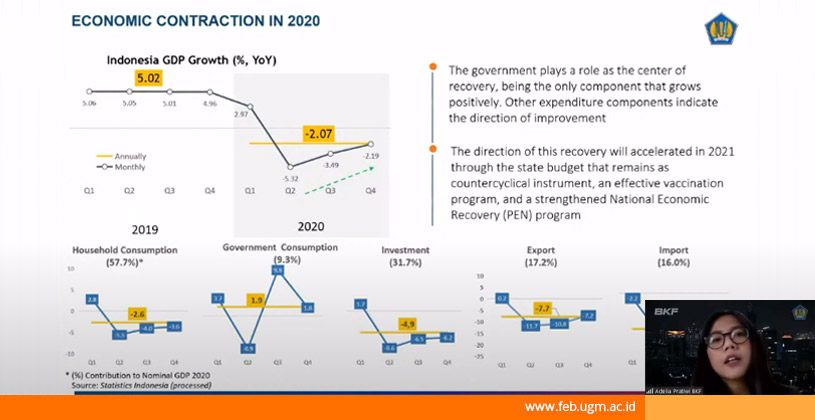Limitation of Activities during a Pandemic, Government Consumption is the Only Driver for Fiscal and Economic Sustainability
- Details
- Written by Sony
- Category: News
- Hits: 1246

The Center for Public Sector and Taxation Studies (PSST), Accounting Laboratory, Department of Accounting, Faculty of Economics and Business UGM (FEB UGM) on Friday (26/02) held a seminar on the topic "Revisiting Fiscal Sustainability During COVID-19 Pandemic in Indonesia". The seminar is held online through the Zoom Meetings Platform. This seminar presented a resource person who is a practitioner of fiscal policy from the Ministry of Finance of the Republic of Indonesia (Kemenkeu RI), namely Adelia Surya Pratiwi, S.E., M.Sc., as Head of the Public Communication Strategy and Management Subdivision, Fiscal Policy Agency, Ministry of Finance of the Republic of Indonesia. The moderator at this seminar was Vogy Gautama Buanaputra, M.Sc., Ph.D., AFHEA., Lecturer at the Department of Accounting, FEB UGM.
Dean of FEB UGM, Eko Suwardi, M.Sc., Ph.D., delivered his opening remarks discussing the importance of fiscal sustainability in Indonesia. "We all know all over the world, and in our country, this fiscal sustainability issue (problem) is important. We need to get first-hand information related to fiscal sustainability in Indonesia. From micro to the macro background, how taxes for individuals and entities become policies after being processed by the Fiscal Policy Agency, and how the world of education can support fiscal and governance policies, "said Eko.
The next session was the presentation of speakers regarding fiscal sustainability during the COVID-19 Pandemic in Indonesia. Adelia invited us to take a glimpse into the history of the nation's economic condition that experienced a deep recession in early 2020.
"In early 2020 we entered into a condition full of challenges, that year (2020) was about extraordinary, there was an economic downturn which was not the same as recessions. the previous economy. The 1998 crisis started from the monetary sector, now it is different, the economic recession was caused by activity restrictions, we get income but it is difficult to spend on economic activity", said Adelia.
Adelia said that the pandemic affected the fundamentals of the Indonesian economy and fiscal. "If a country experiences a deep contraction, which affects society and the business world, then a compensating fiscal policy response, we are given a stimulus so that income does not decrease to a scaring level, entrepreneurs do not go bankrupt, and people have funds for emergencies," she added.
Adelia cited data on the condition of the Indonesian economy, where in the first quarter to the second quarter of 2020, Indonesia experienced a contraction up to minus 5%, and in the fourth quarter of 2020 minus 2.19%. According to her, even though there was a quite deep decline, Indonesia was relatively resilient to the economic downturn as it was helped by consumption.
"Indonesia's consumption remains strong despite the global financial crisis, but now we see the indicators have decreased. So we can see when the government consumption pandemic is the only driver for the economy, when we don't consume, we don't invest, we don't export-import, the only hope is government consumption”, she said.
According to Adelia, during the Covid-19 Pandemic, some sectors experienced a decline, some also experienced an increase. The sectors that contracted deep enough to be negative, in 2020 we see that they are transportation, accommodation, and food & beverage. However, some have recorded positive growth, including the sectors of education, agriculture, real estate, and financial insurance. According to him, these sectors are experiencing growth that is inversely proportional to the national economy in the midst of the pandemic.
Adelia added that several areas can be optimized. First, infection-fighting, Indonesia is facing the pandemic itself with the support of good medical equipment to reduce infection rates and normalize the economy again. Second, Disaster Live, paying attention to society and the business world, the business world must be assisted by fiscal policy, to overcome cash flow problems that have the potential to cause liquidity problems, therefore, the Government provides tax incentive facilities, unemployment benefits for layoffs, and others.
Adelia cited data that even though in conditions of economic contraction, fiscal sustainability in Indonesia when compared to G20 countries, is quite intermediate during this pandemic, Indonesia's fiscal projections are also at the middle level compared to other countries.
"The provision of health spending, vaccines, social protection, and giving lots of tax incentives and loans to create a liquidity constraint was helped, but on the other hand, tax revenue has decreased due to this fiscal policy, investment in health is not enough. to increase our revenue, during a falling economy, expenditures are actually increasing, "she explained.
In addition, she said that government policies must be flexible because the pandemic needs many adjustments. For example in the aid policy to the community, this policy needs to be formulated and must be analyzed first, where the demand will be directed, the provision of assistance will be spent or saved, it is necessary to ensure that the community is given assistance to carry out their spending activities, not for saving, this is necessary to improve the Indonesian economy.
Reportage: Sony Budiarso/Kirana Lalita Pristy


